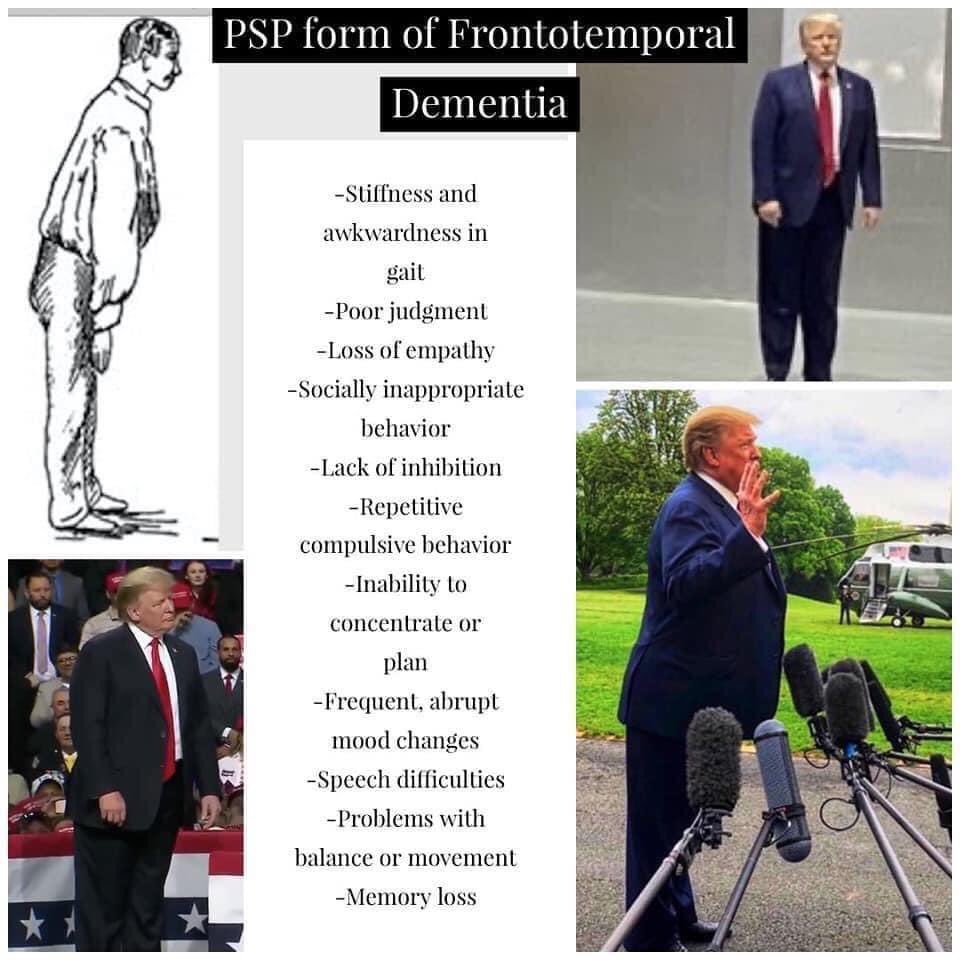Frontotemporal Dementia Stance Images

Frontotemporal dementia is a group of disorders characterized by the loss of nerve cells in the frontal and temporal lobes of the brain which causes these lobes to shrink.
Frontotemporal dementia stance images. Progressive behaviorpersonality declinecharacterized by changes in personality behavior. Hes at risk to jerk fall backward. Frontotemporal Dementia Frontotemporal Disorders vs.
Frontotemporal dementia also known as frontal lobe dementia is a grouping of uncommon disorders that primarily affect the frontal and temporal lobes of the brain the areas generally associated with personality behavior and language. FTD is the diagnosis for about 5 percent of people with major neurocognitive disorders dementia. These areas of the brain are generally associated with personality behavior and language.
An attachment about the PSP form of Frontotemporal Dementia has also gone viral in which the symptoms of the disease have been compiled by an unidentified neurologist in a rather detailed and compelling collage. Stutter steps L leg out L leg crossed over R leg dropping. Trumps balance gait continue to degrade as his Frontotemporal dementia worsens.
He???? ?? s at risk to jerk fall backwards. The cause of FTD is unknown. What is frontotemporal dementia.
Symptoms of frontotemporal disorders vary from person to person and from one stage of the disease to the next as different parts of the frontal and temporal lobes are affected. Trumps posture is the classic frontotemporal dementia stance. He cant stand like the people next to him hands on hips or in the pockets.
National Institute on Aging Official Study Title. He would topple- a good word to describe what he has coming. Frontotemporal dementia is an umbrella term for a group of uncommon brain disorders that primarily affect the frontal and temporal lobes of the brain.

In general changes in the frontal lobe are associated with behavioral symptoms while changes in the temporal lobe lead to language and emotional disorders.
Frontotemporal dementia stance images. A person suffering from the PSP form of frontotemporal dementia possesses stiffness and awkwardness in gait poor judgment loss of. What is frontotemporal dementia. Frontotemporal disorders FTD is an umbrella term that is also used to describe the prime of life diseasesThere are different types of frontotemporal disorders.
There are seven stages of vascular dementia. He uses videos to demonstrate. Frontotemporal dementia FTD is one other type and its a term used to describe a number of disorders that affect the frontal and temporal lobes of the brain.
Alzheimers Dementia Memory Care November 23 2018. Depending on the location of the damage the disorder causes changes in social behavior personality andor loss of language skills. Forward leaning arms down like balancing rods.
Forward leaning arms down like balancing rods. He can???? ?? t stand like. NIH and The AFTD.
Frontotemporal dementia is an umbrella term for a group of uncommon brain disorders that primarily affect the frontal and temporal lobes of the brain. National Institute on Aging Official Study Title. In frontotemporal dementia portions of these lobes shrink atrophy.
Frontotemporal dementia FTD is a group of disorders that result from damage to the frontal and temporal lobes of the brain. Trumps balance gait continue to degrade as his Frontotemporal dementia worsens. Progressive behaviorpersonality declinecharacterized by changes in personality behavior.

Trumps posture is the classic frontotemporal dementia stance.
Frontotemporal dementia stance images. Stutter steps L leg out L leg crossed over R leg dropping. In 2015 he writes he began spotting signs of frontotemporal dementia FTD in Donald J. What is frontotemporal dementia.
While Alzheimers disease is the most common and well-known form of dementia there are many other types. He can???? ?? t stand like. He cant stand like the people next to him hands on hips or in the pockets.
Forward leaning arms down like balancing rods. He???? ?? s at risk to jerk fall backwards. A person suffering from the PSP form of frontotemporal dementia possesses stiffness and awkwardness in gait poor judgment loss of.
An attachment about the PSP form of Frontotemporal Dementia has also gone viral in which the symptoms of the disease have been compiled by an unidentified neurologist in a rather detailed and compelling collage. Frontotemporal dementia FTD is one other type and its a term used to describe a number of disorders that affect the frontal and temporal lobes of the brain. National Institute on Aging Official Study Title.
FTD is the diagnosis for about 5 percent of people with major neurocognitive disorders dementia. Forward leaning arms down like balancing rods. He even reached for Melania 511 cane for balance when he listed to his right.
NIH and The AFTD. Frontotemporal Dementia Frontotemporal Disorders vs. Trump and began tweeting about it in February 2017.








